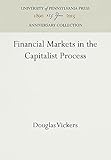Financial Markets in the Capitalist Process / Douglas Vickers.
Material type: TextSeries: Anniversary CollectionPublisher: Philadelphia : University of Pennsylvania Press, [2016]Copyright date: ©1978Edition: Reprint 2016Description: 1 online resource (192 p.)Content type:
TextSeries: Anniversary CollectionPublisher: Philadelphia : University of Pennsylvania Press, [2016]Copyright date: ©1978Edition: Reprint 2016Description: 1 online resource (192 p.)Content type: - 9780812277395
- 9781512808339
- 332.6
- HG4539
- online - DeGruyter
- Issued also in print.
| Item type | Current library | Call number | URL | Status | Notes | Barcode | |
|---|---|---|---|---|---|---|---|
 eBook
eBook
|
Biblioteca "Angelicum" Pont. Univ. S.Tommaso d'Aquino Nuvola online | online - DeGruyter (Browse shelf(Opens below)) | Online access | Not for loan (Accesso limitato) | Accesso per gli utenti autorizzati / Access for authorized users | (dgr)9781512808339 |
Frontmatter -- Contents -- Preface -- I. Financial Theory in the Scheme of Things -- II. Equilibrium Theory of Financial Asset Prices: Theory, Application, Critique -- III. Decisions under Uncertainty: A Nondistributional Variable Approach -- Subject Index -- Author Index
restricted access online access with authorization star
http://purl.org/coar/access_right/c_16ec
The preoccupation of financial theory with static, timeless, equilibrium analysis has given rise to an orthodoxy that avoids the problems of uncertainty in the world. This work establishes new perspectives from which contemporary financial theory can be evaluated. Echoing Keynes' observation that "Human decisions . . . cannot depend on strict mathematical expectation," Douglas Vickers explains why most decisions in economics and finance are not made under conditions to which the calculus of probability applies.The author proposes a "new realism" in financial theory that takes into account the uncertainty in personal and economic decisions. Both business firms and financial investors, he contends, acquire an important perspective on their alternatives by focusing on the transitional, disequilibrium processes in financial markets rather than on their sup posed equilibrium conditions. This involves for economic decisions an understanding of "time" as "historic" in a genuine operational sense rather than as merely a logical variable. The notion of probability should be replaced by that of possibility, the concept that the British economist G. L. S. Shackle has called "potential surprise."In Part I, Vickers' innovative approach leads to a careful study of the "false trading" that occurs in real and financial markets. Part II provides an exposition and an evaluation of the equilibrium theory of financial asset prices. The new analytical apparatus is applied in Part Ill to investment decision making in the firm and to the choice of financial asset portfolios, as well as to the questions of asset trading and changes in portfolio composition.A scholarly and constructive work, Financial Markets in the Capitalist Process will generate controversy among professionals and debate among students for many years to come.
Issued also in print.
Mode of access: Internet via World Wide Web.
In English.
Description based on online resource; title from PDF title page (publisher's Web site, viewed 30. Aug 2021)


